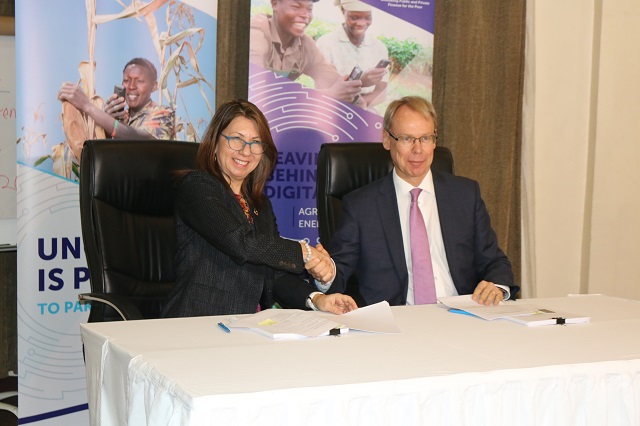
Kampala, Uganda | Julius Businge | The government of Uganda has welcomed the new form of financing – blended finance – to Uganda with the hope of improving livelihoods of communities and businesses.
Blended finance is the use of development finance and charitable funds to mobilise private capital flows to emerging markets which supports investments and community development.
Speaking to about 200 delegates from Uganda and beyond, at a high level conference organized by the United Nations Capital Development Fund (UNCDF) and the Government of Uganda at Hotel Africana in Kampala on June 18, Moses Ali, the first deputy prime minister, said the blended finance and the launch of the report came at a time when the East African countries were passing their budgets and thinking of mobilizing additional resources to finance the plans with focus on the Sustainable Development Goals.
“The issue of visionary leadership except for a few countries in the region is majorly sorted out -all we need now to do is to strengthen our regional presence and deepen our engagements in trade and commerce,” Ali said.
He said that the issue of adequate resources to finance the great plans and visions of governments is still a challenge which is why as government of Uganda attaches a lot of importance to this conference.
He added that the government of Uganda in its commitment and efforts to support private sector growth, job creation and economic empowerment of youth and women, has designed several funds (Agriculture credit facility, Youth Livelihood Fund, Women Economic Empowerment Fund etc) – similar to the blended finance facility.
“I therefore direct the Ministry of Gender, Labour and Social development, Ministry of Finance and Uganda Development Bank as well as the Bank of Uganda to further study the blended finance solution and ensure these funds are sustainably operated using the Blended financing solutions modality,” Ali said.
The Resident Coordinator of UNICEF Uganda, Doreen Mulenga said the event was timely as the world is going through the third year of implementing the SDGD agenda, an ambitious set of the 17 Sustainable Development Goals adopted by the international community in 2015 when Uganda presided over the United Nations General Assembly.
“It is clear that we must accelerate our efforts if we are to achieve these goals,” Mulenga said, adding “The financing gap to achieve these goals in the developing countries is about $4.5trillion annually, which calls for more innovation and dedicated efforts to raise resources to support SDG implementation.”
“Blended financing is one of the innovative approaches that lend itself very well to SDG financing,” she added.
She added that complementing purely public or purely private financing options under the right circumstances can help catalyse the much-needed additional resources for the SDGs.
The meeting also came just a day after Sweden extended a five year $15million funding support to the United Nations Capital Development Fund to implement its new strategy of “Leaving no one behind in the digital era” under the “Connect” Rural Uganda programme.
Mulenga thanked the UNCDF and the Government of Uganda as well as representatives from other countries in the region for their efforts to innovate in areas that impact communities in line with the SDG agenda.
Private sector players that attended the meeting including Joseph Nkandu, the executive director of the National Union of Coffee Agribusiness and farm enterprises said the financing solution would support entities that are unable to access cheap credit from local banks and other lending institutions.
Apart from Ugandans, the meeting was attended by representatives from South Africa, Ethiopia, Zambia, Mozambique, Somalia, Kenya, Tanzania and Gambia.
It was held under the theme “Blended finance and leaving no one behind: opportunities and challenges in Southern and East Africa.”
 The Independent Uganda: You get the Truth we Pay the Price
The Independent Uganda: You get the Truth we Pay the Price


